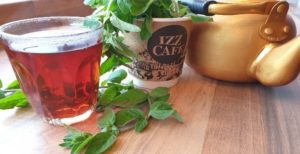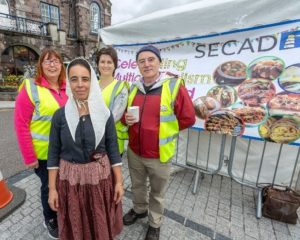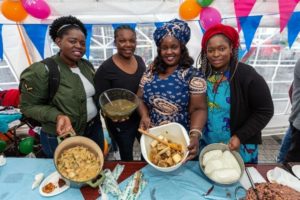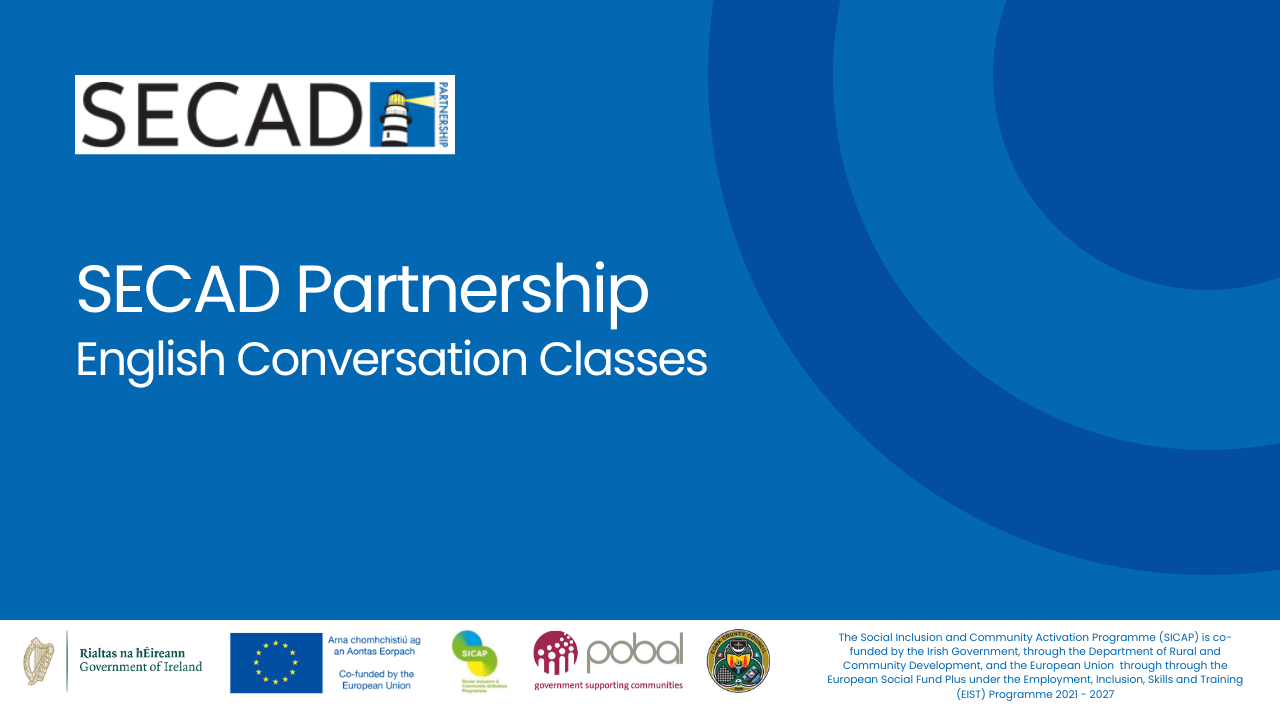Food has always been one of the most important cultural signifiers in the definition of human identity. Since earliest times, food has symbolically marked the transition from nature to culture, playing a leading role in the formation of a sense of belonging to specific cultural dimensions and practices.
Far from being just mere nourishment, food is a universal cultural expression, a fundamental element in our definition of ourselves, through our identity as belonging to a group, and our identity as distinct from other groups.
Claudia Roden, renowned food writer and food anthropologist, who made it a lifetime’s work to follow the migrant journeys of various national cuisine advocates “Food is the last thing exiles or emigrants lose. They stop wearing the clothes, they stop speaking their language, they no longer listen to their music, but the importance of food remains.”
Izz & Eman Alkarjeh – Izz Café

The family spent their first month at a Direct Provision centre in Dublin which was challenging in itself,
“There was no cooking facilities and we had to eat the food we were served which didn’t really suit our family. We were used to traditional Palestinian food cooked by Eman..”
After a month they were transferred to a Direct Provision Centre on the Kinsale Road, Cork. Fortunately Izz and his family were able to cook their own food in the centre which in itself was a turning point for the lives in Ireland.
It was also at this point during 2017 that Izz found out about doing a ‘start-your-own-business’ programme with SECAD which provided a platform to start engaging with other business support entities. Izz completed the programme with a finalised business plan, mentoring support and cash flow projections for his proposed café business.
Izz, originally from Halhul, a town north of Hebron and south of Bethlehem, went to school and then university, in East Jerusalem, eventually graduating with a degree in Computer Science. However circumstances which ensued necessitated Izz and his wife Eman (also Palestinian) to apply for asylum in Ireland. Informed by a friend of the SECAD business start Programme, Izz enrolled and the journey towards setting up Izz Café began in earnest.
SECAD Partnership CLG (SECAD) provides short training programmes for
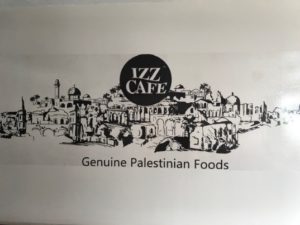
Izz had by now identified a strong potential market for Palestinian food in the Cork area, especially drawing on the very positive feedback he had received from his time cooking at the Direct Provision Centre in Cork His business idea was to set up a Café with Palestinian street pastry, hummus, falafel and soup. The Café would have a special coffee menu, in addition a latte printing service that enables customers to print their selfies, slogans, memories or anything on the cream topping using edible material. The menu would have food suitable for vegans, vegetarians and meat eaters alike
Maximizing Izz’ IT background and interest in marketing the new business on social media platforms, the Café would also house a large branded display, to facilitate photo/selfie capture along with customer commentary and feedback through social media, all of which would be posted under a predefined Izz Café hashtag.
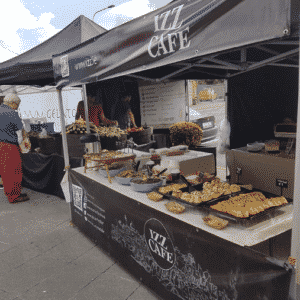
“At the time I was very confident that Izz would succeed in business as he did a tremendous amount of research for his planned business. Izz felt that his Palestinian food would be well received in Cork and that it had a particular niche when compared to other cafes in Cork.”
Initially, funding was the biggest struggle so he decided to build up his savings by selling at a farmer’s market. This also afforded him a great opportunity to get customer feedback. He did this for one year. He received advice from the Allen family in Ballymaloe in supporting him to start selling via a farmers’ market.
On their first day at Mahon Point Farmer’s Market, their entire stock sold out in two hours and a new market star was born.
“After starting the markets we really saw the potential of our foods and the skill of Eman as well in really presenting it. Even when the weather was terrible, she still gave it the same quality and we got huge feedback, interviewers with food bloggers and journalists and they loved the food.”
Shortly afterwards on 1st May 2019, Izz and Eman’s dream came true as Darina Allen cut the ribbon, performing the opening ceremonies at their brand new cafe/restaurant, Izz Café.
Future Plans
Izz hopes to employ staff soon in order to open the café earlier and provide a breakfast offering. In the future he hopes to open a chain of ‘Izz Cafes’ around Cork and prepare the food for each café from a central kitchen. Other cafes have expressed an interest in selling sweet treats made at Izz café so he is exploring the potential of this also.
‘SECAD Celebrating Multiculturalism through Food’
Using Food as a Powerful Engagement & Integration Tool
First piloted in 2017 by SECAD Partnership CLG, this approach is based on the concept of bringing people from different ethnic backgrounds together at street, neighbourhood and community levels through a programme that is focused on linking the development of a positive multi-cultural community through ‘food-based events and interactions’.
The theme of integration in sharing cultural diversity through food has been undertaken in Midleton and Macroom as part of their Summer Food Festivals over the past three years.
These Festivals are the two largest community food events each year in South Cork supported by local traders, Cork County Council and run by local volunteers.
Engagement & Collaboration
SECAD ran a series of actions through SICAP and the Communities Integration Fund in 2017 and 2018 aimed at introducing new forms of linkages across the ethnic groups resident in the communities and surrounding areas. This resulted in groups meeting to discuss, promote, learn and share food related ideas in their locality.
In Macroom, the International Food Flavours initiative includes French, Spanish, Hungarian, Bangladeshi, Italian and Irish participants.
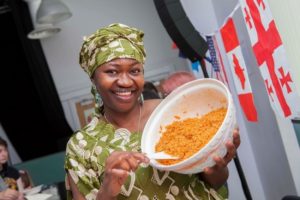
Utilising a ‘food approach’ is the first part of a broader suite of methodologies to engage with communities who may sometimes be marginalised – linking this to ‘multi-culturalism’ and to successful community-based events helps to raise the profile of this work and
the respect for those that are involved.
By developing trust with all parties concerned, it is hoped that these initiatives will serve to highlight both the barriers and possible solutions to integration such as improving spoken and written English, raising cultural respect and awareness (across the community), personal development, accessing skills and education supports.
A further objective of the Food Fusion and Food Flavours initiatives under the central banner of ‘SECAD Celebrating Multiculturalism through Food’, is to develop plans for rolling out further tailored actions in line with needs identified as part of research undertaken via local New Communities champions (Family Resource Centres in both Midleton & Carrigtwohill). This local research, supported by SICAP, has provided insights into the New Communities profile and trends in those areas.
FEAST FOOD FESTIVAL – ‘SECAD Celebrating Multiculturalism through Food’
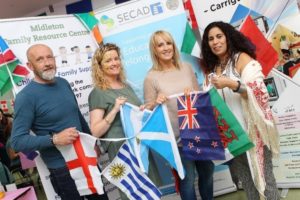
They included:
Ghana, Ivory Coast, Nigeria, Benin, Belgium, France, Italy, Poland, Albania, Palestine, Lebanon, Syria, Morocco, China, and Ireland.
Maps were prepared, flags hoisted, national anthems played, as well as various music and songs from the participating countries. Great interest was shown in the food, and several expressions of interest were made regarding ingredients, preparation and cooking, etc.
Spin off to other Multicultural Events
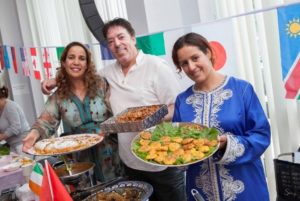
Further events were held including one in cooperation with some local pre-schools and Montessori schools.
Transport for residents and children from ‘Ashbourne Accommodation Centre’ (part of the Reception and Integration centres or Direct Provision[1]) was arranged to enable them to participate in this event.
Carrigtwohill
Carrigtwohill is one of most vulnerable and yet dynamic communities in East Cork. It has grown from a small rural village to a large urban settlement over the past decade, and its population growth has increased radically and much more than the national average. All the families who are engaged with the Family Resource Centre are encouraged to become actively involved in the community around them.
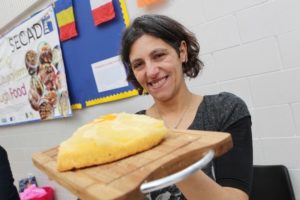
In Carrigtwohill, 76% of the total population were born in Ireland, 10% of the population were born in Poland, 3% were born in the UK, while 6% of the population are from the ‘rest of the world’. There are in Carrigtwohill, 159 people who are from the other EU 27 countries.
SICAP support enabled the FRC to continue working with their entire community to obtain everyone’s views through arranging activities around food, arts, and tradition.
Midleton

a) Eastern European Community
b) African Community
c) Asian Community
d) Children (all Nationalities including Irish)
e) Men (All Nationalities non-Irish).
They discussed retaining and maintaining their National identity as very important and that they reinforce this within their children.
They highlighted that their children attending e.g. ‘Polish School’ was very important – this being an extra-curricular activity on the Educate Together Campus. However. they equally felt that their children having non-polish friends was equally important. ‘They are after all Irish too’ one participant stated.
However, some New Communities admitted they felt isolated within the catchment area, although again very much connected in terms of supporting each other.
Macroom
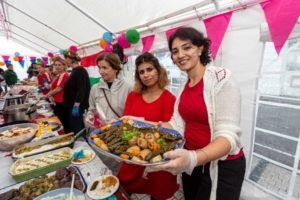
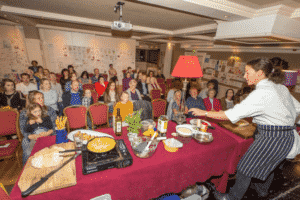
The programme set out to develop relationships at street and neighbourhood levels and in rural areas within parishes to develop the first levels of a peer support group. As this work evolves it aims to focus on integration barriers including literacy issues, cultural challenges and more fundamental issues of inequality, racism and prejudice.
The Future
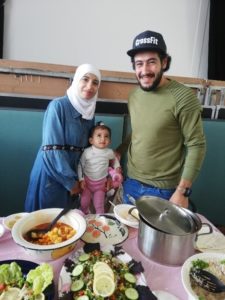
- To plan and deliver a Community Festival in East Cork to show-case the cultural diversity within the catchment area, to promote ‘difference’ as a positive.
- To plan and facilitate ‘Cultural Inclusion Training’ – through Food – to combat racism
- Identity Seminar – focused on the divergence of cultures and the fear of the total rejection of cultural heritage by adopting Irish/ European Cultural norms – this would focus on Young People and their sense of Identity.
Food, Glorious Food – The Powerful Common Denominator & Cultural Integrator
Midleton and Carrigtwohill welcomed Syrian refugee families during the summer of 2019 through the Community Sponsorship Initiative currently being piloted in Ireland. SECAD played a supporting role in this process on behalf of the Department of Justice in identifying suitable community groups to sponsor these families and support their integration into local life in Midleton and Carrigtwohill.
Now both families have arrived on Irish soil, SECAD is available to provide employment and career guidance supports to the adult members of the Syrian families. However, it is once more, the FOOD platform which has been most successful in our initial engagement of these new families, with both fully engaged in recent Festival events, and onwards to other support programmers including our new ‘Making Health a Habit’ Programme for families which has a major focus on, you guessed it, FOOD!
[1] Direct provision is a means of meeting the basic needs of food and shelter for asylum seekers directly while their claims for refugee status are being processed rather than through full cash payments.


